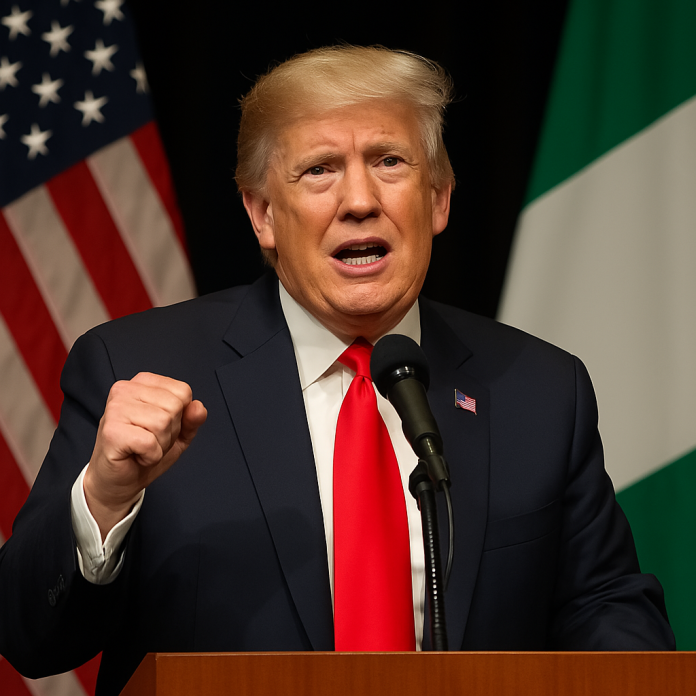By Newspot Nigeria
As President Donald J. Trump begins his second term, a noticeable shift is underway in U.S. foreign policy—one that African leaders must respond to with strategic foresight. For Nigeria, this is not a time for ideological posturing, but for smart, forward-thinking engagement with partners who can drive mutual prosperity.
Olowokere’s Insight: Strategy Over Sentiment
In his recent article for Green White Green, Titus Olowokere offered a timely perspective on how Nigerian entrepreneurs can navigate shifting U.S. trade policies:
“Such barriers are not insurmountable walls but mere hurdles to be vaulted with ingenuity and strategic acumen.”
This message is especially relevant as Nigerian companies—from tech leaders like Flutterwave and Paystack to heritage brands like Adire Textiles—pursue opportunities in the U.S. market. As diaspora demand, e-commerce, and niche exports grow, the United States remains a valuable destination for well-positioned Nigerian businesses.
Strategic Gateways: The Role of USNBC and CCA
Two key U.S.-Africa institutions provide essential entry points for Nigeria’s economic diplomacy:
- The U.S.-Nigeria Business Council (USNBC) supports Nigerian companies by facilitating business partnerships and organizing bilateral trade missions.
- The Corporate Council on Africa (CCA) connects African governments with U.S. investors and policymakers through high-level advocacy and sectoral summits.
Trump’s 2025 Emergency Tariff Order: A Global Shake-Up
On April 2, 2025, President Trump signed a sweeping executive order under the International Emergency Economic Powers Act (IEEPA), declaring the U.S. trade deficit a national emergency and launching a new global tariff regime. Beginning April 5, a flat 10% tariff applies to all imports. Then, on April 9, countries with the highest U.S. trade deficits—including China, India, and others—face even higher, country-specific reciprocal tariffs.
According to the White House, the goal is to restore domestic manufacturing, address unfair trade imbalances, and protect U.S. economic sovereignty. Some critical sectors—such as energy, semiconductors, pharmaceuticals, and defense-related goods—are exempt. USMCA-compliant goods from Canada and Mexico are also shielded.
This action marks a turning point. The administration argues that tariffs are essential to rebuilding America’s industrial base, citing decades of manufacturing decline, national security concerns, and persistent trade disparities—particularly with nations that impose disproportionately higher tariffs or non-tariff barriers on U.S. goods.
Impact on AGOA Countries
The reciprocal tariff order affects 32 African countries previously protected by AGOA’s duty-free trade access. A Center for Global Development report confirms that apparel-exporting countries like Lesotho, Mauritius, and Madagascar now face tariffs up to 60%.
While Nigeria’s oil exports are exempt, other exports face renewed uncertainty. In 2023, Nigeria exported $5.7 billion worth of goods to the U.S. under AGOA—behind only South Africa’s $14 billion. With AGOA set to expire in September 2025, Nigeria must immediately engage diplomatically to secure exemptions or push for renewal.
What Nigeria Must Do: Engage with Purpose
The Tinubu administration should:
- Host a Nigeria–U.S. Innovation and Trade Roundtable, focusing on tech, agribusiness, and logistics.
- Mobilize the diaspora for co-investment in export-ready sectors.
- Ensure government participation in USNBC and CCA is outcomes-driven—not estacode-driven.
- Align AGOA trade strategy with AfCFTA goals for regional competitiveness.
It’s Time to Lead Strategically
President Trump’s second term presents Nigeria with a pragmatic window for renewed U.S. engagement. Rather than default to binary alliances or outdated preferences, Nigeria should step into this moment with clarity and purpose.
As Titus Olowokere rightly observed:
“Beyond tariffs lies a wealth of possibility. Beyond uncertainty lies prosperity.”
Nigeria has the talent, resources, and global footprint to shape the future—not just follow it. Let us lead with confidence.
Sources & Further Reading:
- Beyond Tariffs: Unlocking the $20 Trillion U.S. Market for Nigerian Entrepreneurs – Titus Olowokere, Green White Green Media
- The New US Tariff Regime Is Another Blow for Africa – Center for Global Development
- Corporate Council on Africa
- U.S.-Nigeria Business Council
- White House Fact Sheet on National Emergency Tariff Order
Share your story or advertise with us: Whatsapp: +2347068606071 Email: info@newspotng.com

















